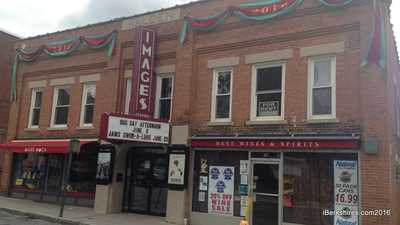Images Presents Annual 'Fresh Fest' on Food, Farming
WILLIAMSTOWN, Mass. — Images Cinema presents Fresh Fest: A Food and Farming Film Festival, Friday, May 7 through Thursday, May 13.
Produced by Images Cinema, in collaboration with Storey Publishing and the Williams College Center for Environmental Studies, this annual film festival explores the ways farming and food culture impacts our lives in rich and varied ways, and makes links to local farmers and food producers.
This year Fresh Fest will happen virtually this year, on Images' Virtual Cinema platform,
watch.eventive.org/imagesvirtual. All films are free to view and will be available for the full week with the exception of Gather, which will be available for one show only, TBA.
This year features a world premiere of "Finding Hope in Farmland," a short film by Williamstown-based filmmaking team, director Dave Simonds and producer Sarah Gardner, about a Somali Bantu community starting a farm in upstate New York. The festival also includes "The Long Coast," about Maine's changing fishing industry; "Fruits of Labor," a documentary about a Mexican American high school student who supports her family harvesting and processing strawberries; and "Gather," a film about Native American food traditions.
Fresh Fest is supported in part by the Cultural Council of Northern Berkshire. Fresh Fest is also sponsored by Storey Publishing and the Williams College Center for Environmental Studies.
Films (descriptions from press release):
'The Long Coast'
"A meditative mix of interviews, striking but unobtrusive cinematography, and, yes, Maine's uniquely picturesque, majestic coastal beauty." — Portland Herald
In a series of lyrical portraits, "The Long Coast" illuminates the stories of Maine's fisher people, those whose lives and livelihoods are inextricably connected to the ocean. This atmospheric film shows the beauty, intimacy, and uncertainty that coastal dwellers face in rooting their lives in the ocean, particularly as human actions — from overfishing, to aquaculture, to warming seas — confront Maine and its people with profound change. (81 minutes)
"Fruits of Labor"
"Given the political and social upheaval that Latinos face in this country, it is amazing to see a documentary that humanizes and concretely showcases those who grapple with immigration status, working long hours at a laborious job, and who attempt to juggle their personal and family life." — Black Girl Nerds
A Mexican-American teenager dreams of graduating high school, when increased ICE raids in her community threaten to separate her family and force her to become the breadwinner for her family. She works long days in the strawberry fields and the night shift at a food processing factory. Set in an agricultural town on the central coast of California, "Fruits of Labor" is a coming of age story about an American teenager traversing the seen and unseen forces that keep her family trapped in poverty. A lyrical meditation on adolescence, nature and ancestral forces, the film asks, what does it mean to come into one's power as a working young woman of color in the wealthiest nation in the world?
Most documentary films about farmworkers look at public personas — the political is in the rally, the strike, and the public speech. Fruits of Labor offers a new narrative about women workers that shows the nuances of how the global food system intersects with gender and family life. (78 minutes)
"Finding Hope in Farmland"
World Premiere; by local filmmakers, director Dave Simonds and producer Sarah Gardner
This short documentary is the story of a refugee community seeking to revive their agrarian heritage. The Somali Bantu refugees in Utica New York arrived in the U.S. in the late 1990s. A marginalized agrarian peoples from Southeast Africa, the Bantu had endured centuries of oppression and slavery. In 1991, during the Somali Civil war, about 12,000 Somali Bantu people were displaced to Kenyan refugee camps and in the late 1990s many were identified by the United Nations as an "extremely vulnerable” people "who could not return to their home country.”
Arriving in the U.S. as refugees, many eventually resettled to the rustbelt cities of upstate New York that were experiencing industrial decline and population loss. As they rebuild their communities in New York State, many dreamt of reviving their agrarian heritage and providing food for their community. "Finding Hope in Farmland" follows their quest for land and their relationship with farming advocates at Cornell Cooperative Extension who helped them realize their dream. (15 minutes)
"Gather" — One Screening Only — TBA
"Gather" is an intimate portrait of the growing movement amongst Native Americans to reclaim their spiritual, political and cultural identities through food sovereignty, while battling the trauma of centuries of genocide.

